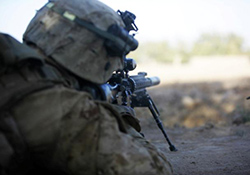Office of Research & Development |
 |
Office of Research & Development |
 |

VA Research Currents archive
Posted September 13, 2013
(Fall 2013 VA Research Currents; online ahead of print)

A Marine sniper aims at an insurgent during a firefight in Helmand province, Afghanistan, in 2010. VA psychologist Dr. Shira Maguen and colleagues are developing and testing a therapy that specifically addresses issues related to killing during war. (Photo by Sgt. Albert J. Carls)
Soldiers have killed in war for thousands of years. But research on the emotional trauma of killing, says VA psychologist Shira Maguen, PhD, is "in its infancy."
Maguen is a pioneer in the area. She and VA colleagues are developing new ways to help Veterans who struggle with the emotional trauma and burden of having killed others during their service.
"It's a heavy thing to carry with you," says Maguen.
Her group has developed a treatment module to be used along with established evidence-based psychological treatments such as cognitive processing therapy or exposure therapy. The module, called the "Impact of Killing," consists of six to eight sessions and includes a manual for therapists.
"We know the evidence-based treatments work," says Maguen. "This is something that can be done in addition, for those who can benefit from it."
Results from an earlier pilot study, funded by the University of California, San Francisco, suggested the new therapy is feasible and effective.
Now, it is being tested in a clinical trial funded through VA's Mental Health Quality Research Enhancement Initiative.
Among other questions, the current study will look at the ideal timing of the therapy as an adjunct to standard evidence-based treatments.
The approach is based on the clinical work of Maguen and others, and on findings from several studies that probed the thoughts, feelings, and experiences of combat Veterans from different eras, related to whether they had killed during war.
"As a clinician, I was finding that the issue of killing often didn't come up until later in therapy," shares Maguen. "I saw that people really were impaired and troubled by this. I realized how important it would be to integrate this into the work we do with Veterans."
She stresses that the extra dose of psychotherapy is not for everyone. "Obviously, not everyone has killed in war and struggled with this," she says. "And some people know they killed, but they feel they did their duty, this is what they were trained to do, and they're not troubled by it at all."
The question of killing in war is a thorny one, psychologically and otherwise. In the fog of war and the violent chaos of the battlefield, who exactly does the "killing" is often not black and white.
Maguen: "For some, it's clear in their mind—they killed someone, they saw the person die. For others, it's not as clear. Perhaps they were in a leadership position, and they ordered someone to kill. So they feel responsible for the death, even though they didn't pull the trigger themselves." She notes that any number of military jobs outside of actual combat can still put troops in situations where they feel they contributed to killing, directly or indirectly.
"Once we get into the therapy, we find that people can interpret having killed someone in many different ways. That's understandable. The important thing is that on some level, they struggle with this issue."
One emerging issue concerns military drone operators, who may be stationed in the U.S. but who play a direct hands-on role in targeted killings abroad. Maguen said she hopes to study this area in the near future. "There's been some preliminary research showing that the stress is very high for these Service members. In interviews, many of them talk about doing this work and then having to go home to their family at the end of the shift. So it's a very different and unique situation."
"Everyone deals with it so differently," says Maguen. "One of the important things in designing this treatment was to leave flexibility, so it could be personalized for each individual."
For some Veterans, spirituality plays a key role. Maguen says many military chaplains have expressed interest in her work, and she in turn has found that "involving spiritual communities" can be helpful as part of therapy for some Veterans.
A related theme that Maguen and colleagues have helped explore is "moral injury." This occurs when people feel their actions—even if they had little choice—violated their own internal moral compass, their value system. "It can be very devastating to some people. They can feel very isolated." She says putting a formal label on such feelings can often help people understand they are not alone in the experience, and it frees them to talk about it.
Another issue is stigma. It often comes up, says Maguen, when Veterans return home. "There could be a greater understanding among other military families, among fellow Veterans, but it plays out when Veterans who are returning feel that the people they are in close contact with really don't understand what they've been through. Then, the issue gets worse. They feel like they can't talk about it, and they keep the experience to themselves."
Despite differences in the overall societal reception for Veterans of different eras—say, between Vietnam and today—there are timeless similarities in how people are affected by wartime killing, and how they process the experience in their minds.
"Because of that internal experience," says Maguen, "we're finding that this treatment holds true for Veterans of all generations."
Dr. Shira Maguen and colleagues have studied how wartime killing—as a distinct part of the overall combat experience—affects Veterans' mental health. Here are some of their findings: